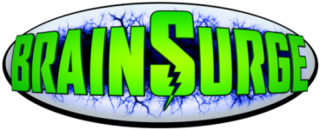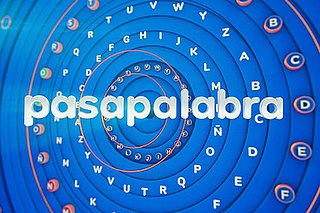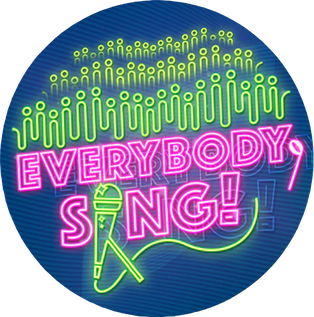Related Research Articles

Now You See It is an American television game show created by Frank Wayne for Mark Goodson-Bill Todman Productions. The object of Now You See It is to answer general knowledge trivia questions by finding the answers hidden in a grid, similar to a word search puzzle.

The Chair is an American game show that was created by Julie Christie, Darryl McEwen and Brian Bigg for Touchdown Television. Although The Chair was originally developed in New Zealand, the first country where the program aired in was the United States. The American version, which was hosted by former tennis champion John McEnroe, aired on ABC for nine episodes from January 15 to March 18, 2002; the American version would be canceled with four episodes remaining unaired of its original 13-episode order. McEnroe would later host the British version, which aired between August 31 and November 9, 2002, on BBC One. Among the show's writers was writer/actress Teresa Strasser, who had served on ABC's Who Wants to Be a Millionaire? and later hosted TLC's While You Were Out.
A*mazing is an Australian children's television game show that aired between 16 May 1994 until 1998 on the Seven Network. It was famous for a relatively large and elaborate maze/obstacle course that was part of the show's studio set. A*mazing was hosted by James Sherry for the entire run of the series. A*mazing was produced at Channel 7 in Brisbane from 1994 to 1996 and then at Channel 7 in Perth from 1997 to 1998.
itbox is a networked gambling games terminal which is found in thousands of pubs, leisure centres and amusement arcades in the United Kingdom. Classified as a "skill with prize" (SWP) machine, each itbox terminal typically includes 25 different games. Each game costs 50p or £1 to play and lasts between 10 seconds and several minutes. From most of these games it is possible to win modest cash prizes. Although strictly the name 'itbox' refers only to Leisure Link-made terminals, the name is often casually applied as a genericized trademark to other SWP terminals such as Paragon SWP, Gamesnet, ind:e and Fatbox.

Game Ka Na Ba?, formerly Pilipinas Game Ka Na Ba is a Philippine game show created by ABS-CBN Studios. The main goal of the game is to win 2 million pesos by answering trivia questions.
Mad Libs is an American children's game show based on the book/word game series. It aired on the Disney Channel from July 26, 1998 to mid-1999, and was hosted by David Sidoni. Dick Clark and J. D. Roth produced the show.
Ruck Zuck is the German version of the short-lived U.S. game show Bruce Forsyth's Hot Streak. It premiered on January 11, 1988, and ended on October 20, 2000 and four years later it came back to Tele 5 on October 25, 2004 and ended on June 3, 2005. Like its American counterpart, the series was packaged by Reg Grundy's Worldwide television empire. During its 1988–2000 and 2004–2005 run, Tele 5, RTL II and tm3 in its original incarnation, ran the show. The show was revived on RTLplus from October 17, 2016 to December 8, 2017.
PDQ and Baffle are American television game shows created by Heatter-Quigley Productions. Both shows' objective was for contestant/celebrity teams to guess a given word or phrase in the shortest amount of time with the fewest letters given as possible.
Burgo's Catch Phrase was an Australian game show that ran between 1997 and 2003, produced by Southern Star Group for the Nine Network. The show was based on the British and American versions of the programme, and was originally known simply as Catch Phrase until 1999 where the show was renamed as Burgo's Catch Phrase in honour of its host, John Burgess. The show was cancelled in 2003 after a revamp of the show and a hiatus in 2001. The show ended on 26 November 2003.
Skatoony is a children's live action/animated game show, pitting live-action kids against cartoons. The series was co-produced by Talent TV and FremantleMedia Animation, Blink Studios, and Marblemedia with Smiley Guy Studios. The series used to air on Cartoon Network in the UK until 2017, with new episodes airing every Friday until the series cancellation in 2008. Skatoony has also aired as re-runs in the UK on Boomerang and Cartoon Network Too until the channel itself closed down in 2014. The show aired on Starz Kids & Family in the US until 2019. Reruns were occasionally shown on Teletoon in Canada until August 5, 2017. It also aired on Boomerang in Australia and New Zealand.

The Mint is an Australian phone-in quiz show based on the British program of the same name, and broadcast on the Nine Network in selected areas in the late night time slot (post-midnight).

BrainSurge is an American children's game show that aired on Nickelodeon and was hosted by Jeff Sutphen. The show taped its first season in February 2009, and debuted on September 28, 2009. The show's format was adapted from the Japanese game show Brain Survivor. The U.S. version was created by Scott A. Stone, co-creator of Legends of the Hidden Temple, and Clay Newbill, executive producer of The Mole.
Family Feud was an Australian game show based on the American show of the same name. The program ran on the Nine Network from 1978 to 1984, and on the Seven Network from 1990 to 1996. The program has been revived twice, in 2006 and 2014.
Family Game Night is an American television game show based on Hasbro's family of board games and EA's video game franchise of the same name. The show was hosted by Todd Newton. Burton Richardson was the announcer for the first two seasons; he was replaced by Stacey J. Aswad in the third season, and Andrew Kishino was hired for the fourth season. The 60-minute program debuted on October 10, 2010, on The Hub ; it was previewed on October 9, 2010, on its sister channel, TLC. Seasons 1 and 2 contained 26 and 30 episodes respectively. Seasons 3, 4 and 5 each contained 15 episodes. Season 2 premiered on Friday, September 2, 2011, with additional games being added. The games added to the second season included Cranium Brain Breaks, Green Scream, Ratuki Go-Round, Simon Flash, Operation Sam Dunk, Trouble Pop Quiz, and Spelling Bee. However games from the previous season were still kept.

Scrabble Showdown is an American game show created for the American cable network The Hub. The program was based on the board game Scrabble and was hosted by Justin Willman. It ran from September 3, 2011, to April 15, 2012.
Download is an Australian children's game show which aired on the Nine Network from 2000 until 2002. Scott McRae hosted the show in 2000–2001; he was replaced by Nathan Lloyd in 2001–2002, while Emily Jade O'Keefe hosted the final season of the show. The co-host for the final season was Miss Bytes.
Keynotes is an Australian game show that aired on the Nine Network. It originally ran from 2 March to 5 June 1964 with Alistair McHarg as host. It was revived from 30 November 1992 to 26 February 1993 with Richard Wilkins as host.

Pasapalabra is a Spanish television game show, adapted from the British format The Alphabet Game. The title is a portmanteau of the Spanish verb pasar, "pass", and palabra, literally "word".

Everybody, Sing! is a Philippine musical game show created, developed, produced and distributed by ABS-CBN Studios. Hosted by Vice Ganda, it premiered on June 5, 2021, replacing the third season of Your Face Sounds Familiar. The first season concluded on October 10, 2021, and was replaced by Pinoy Big Brother: Kumunity Season 10. The show returned for its second season on September 24, 2022, replacing the second season of Idol Philippines. The second season concluded on February 19, 2023, and was replaced by the fifth season of The Voice Kids. The show returned for its third season on June 3, 2023, replacing the fifth season of The Voice Kids. The third season concluded on February 11, 2024, and was replaced by the third season of The Voice Teens.
Family Game Fight! is an American game show where families compete in challenges to win $100,000 in prize money. The show is hosted by Kristen Bell and Dax Shepard, marking their first television project together. The series aired on NBC from August 8, 2021 to August 7, 2022.
References
- ↑ Allen, Danny (19 March 2013). "Retromodo: Okay, Who Remembers 'Now You See It'?". Gizmodo AU. Archived from the original on 15 August 2020. Retrieved 7 March 2021.
- ↑ Haas, Lynnette (26 November 1998). "Kings of the kids". What's On. The Courier-Mail . p. 6. ISSN 1833-5772 . Retrieved 17 April 2021– via Newsbank.
- ↑ McNamara, C (6 December 1998). "Scott's new role in rock". TV Scene. The Courier-Mail. p. 7. Retrieved 17 April 2021– via Newsbank.